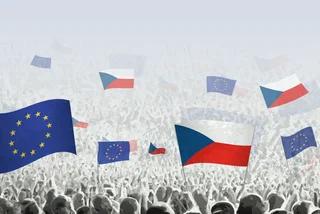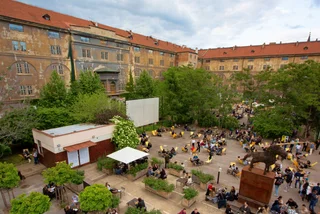Despite the EU’s economic benefits to Czechia since 2004, if you think all people in Czechia love the bloc, think again.
According to a newly released Eurobarometer survey, residents in Czechia view the EU the least positively out of all countries in the bloc. Just 35 percent of respondents view the union favorably, compared with an EU-wide average of over half.
Despite massively improved infrastructure and GDP since joining the group two decades ago, Czech society remains deeply frustrated with the EU. Here's the lowdown.
EU is not great for daily life, Czechs say
According to the Eurobarometer study, just 31 percent of people in Czechia see EU policies as having a “positive effect” on daily life, the lowest in the entire EU, while 30 percent say it’s negative.
Additionally, less than two-thirds of Czechs believe their country “benefits” from EU membership, substantially lower than the EU average of 73 percent.
Czechia says a big ‘no’ to enlargement
Support for EU enlargement is at a record low, according to the Eurobarometer. In fact, out of the entire EU, only French residents are less enthusiastic about expanding the EU. Just four in 10 people in Czechia want to see more countries join: a sharp contrast to neighbors Poland, at 70 percent.
PARTNER ARTICLE
However, people in Czechia like the idea of some new EU countries more than others. Only 29 percent favor Albania joining the EU, placing the country at the bottom of the EU ranking for this Balkan country.
On the other hand, Montenegro enjoys the highest amount of support within Czechia for EU ascension, with almost half the population wanting to see the euro-using country join the union.

Migration and money also concern
Migration dominates worries, with 52 percent naming “uncontrolled migration” as a “key issue and personal concern”—the highest in the EU, tied with Cyprus and Slovakia.
Economic and financial disparities between EU member states are also prominent, cited by 44 percent of Czechs, second only to Austria.
People in Czechia are also among the least supportive of EU-level funding, expressing that projects should be financed individually, rather than collectively.
Views on defense are mixed
Czechia’s residents are not as keen on the EU solving global crises as other member states. Less than half, 48 percent, want the EU to play a bigger role in protecting citizens from international crises, far behind nations at the top of the ranking: Cyprus at 91 percent.
That said, defense and security remain important for Czechs, with 36 percent citing them as a top concern, although this is down 5 percentage points from earlier this year. Only the economy and industry were prioritized higher.
On an EU-wide level, respondents most often named inflation and the cost of living when suggesting which problems the European Parliament should prioritize.













 Reading time: 2 minutes
Reading time: 2 minutes 





























